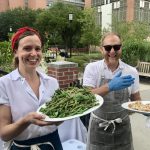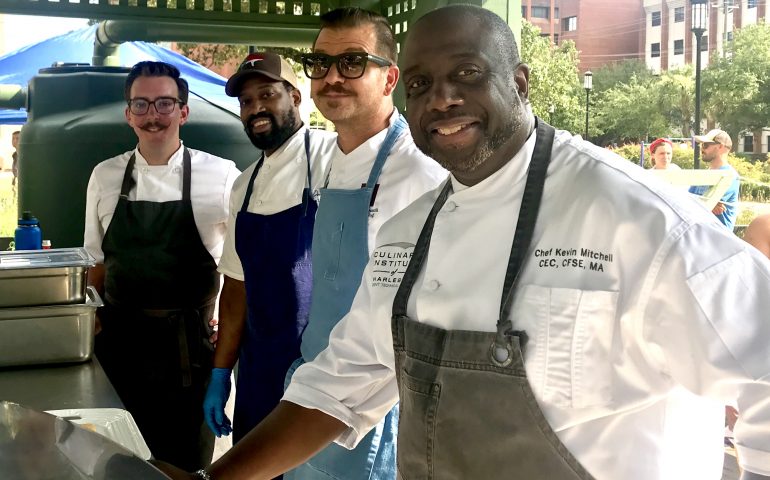Written by Community Partner and contributor Sterling Eason, Board of Directors, Slow Food Charleston. Follow Sterling at @sterlingeason and Slow Food Charleston at @slowfoodchs.
Let’s talk about Albanian bees, shall we?
In the craggy and rocky mountains of southeastern Albania, far from the sulfurous pluff mud of the Lowcountry, grows a tiny alpine flower called Bedunica. Its bloom in late August attracts a particularly industrious local bee who makes honey from its nectar. Locals heap large spoons of the green-colored liquid into their mountain herbal tea each day as they have done for centuries. Rich in magnesium and vitamins A, E, and C, generations have sworn that it keeps lungs clear and livers healthy during dry and cold winter months. While maneuvering narrow cliffs, the beekeepers continually move the hives from flower cluster to flower cluster to capture as much of the nectar as possible, making this bold-tasting honey — a true labor of love.
However, as younger generations exit the region for larger cities, the knowledge of how to produce this time-intensive product is dying out — creating the potential for a beloved traditional ingredient to become extinct. With a higher than average price tag due to its rarity and health benefits, the honey has a crucial role in driving much-needed money to the local economy. In Albania, Slow Food and its partners are now making concerted efforts to market the honey at local and national levels to encourage agro-tourism initiatives, thereby driving money back to the villages and creating a circular economy.
Why should we care about this Albanian honey?
Because, as a society, we are becoming more and more homogenized. Biodiversity and small–scale, family-based food production systems are in danger due to our increase in industrialization, genetic erosion, and changing consumption patterns. We have our own bedunica honey issues here in Lowcountry. The more our communities become educated on what we are losing, the more likely we are to create innovative models to ensure they survive and thrive.
Sound the horns for the Ark of Taste
What is the Ark of Taste, and why should we care?
Created by Slow Food International, The Ark of Taste was created to point out these types of products and draw attention to the risk that they might disappear within a few generations. With over 150 countries contributing to the living catalog of delicious and distinctive foods facing extinction, Slow Food, its partners, local farmers, and community members are keeping them in production and on our plates. Ark of Taste works to shine a light into the dark corners where traditional ingredients and techniques may be dying out.
Back to the Lowcountry and You
At the local Slow Food chapter here in Charleston, we are focused on not only the pleasures of the table with a commitment to protect the community, culture, and knowledge that make this pleasure possible but on working to save at-risk regional ingredients in our backyards. Our efforts along with other Slow Food chapters of the region have helped to bring back Ingredients such as Jimmy Red Corn, Carolina Gold Rice, and Tupelo Honey.
This is where you come in. Consider some of the following things:
- While making your list to shop, make an effort to seek out the local products in your area.
- Prioritize your ingredients like you would prioritize your health.
- Add a reminder to your calendar to shop each week at the local farmers’ market.
- Ask farmers questions about varieties. Get to know your food as it pertains to your area.
- Make decisions based on knowledge rather than convenience.
- And, lastly, work to embrace the idea that the stronger our community is, the stronger our lives will be.


Photo credit: Sterling Eason, taken at Slow Food Charleston’s Ark of Taste Fundraising Dinner at MUSC Urban Farm, June 2019


